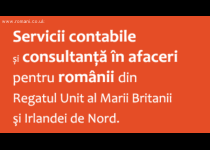Pe vremea aceea, Romania insemna Ceausescu, Dracula, orfani si tigani cersetori. Tabloidele britanice au reusit, intre timp, sa modifice aceasta perceptie, prin campania sustinuta impotriva romanilor. Drept rezultat, perceptia publica s-a schimbat, si nu in bine. Romania este acum sinonima cu afluxul de neoprit al muncitorilor necalificati. Ei invadeaza aceasta tara, furand locurile de munca ale britanicilor si suprasolicitand serviciile sociale.
Ca roman traind in Marea Britanie, vine un moment in care te simti obosit. Obosesti incercand, de unul singur, sa schimbi imaginea tarii tale, obosesti sa fii privit cu superioritate doar din cauza nationalitatii tale. In 2004, speram ca Europa si Marea Britanie vor fi multumite cand vom adera la Uniunea Europeana, in 2007. Speram ca vom fi tratati cu respect, ca vom beneficia de aceleasi drepturi cu ceilalti membrii ai Uniunii.
Acum simtim ca suntem tratati ca cetateni de categoria a doua. Ni se fac cunoscute obligatiile ce ne asteapta, dar ne este dificil sa vedem in ce constau drepturile noastre. Propunerea domnului Reid exclude aproape toate categoriile de muncitori. Cele cateva permise de lucru anuntate ca disponibile in ianuarie 2007, pentru emigranti supracalificati, nu ajuta la nimic. Statisticile arata clar ca slujbele cautate de romani sunt in cu totul alte domenii, in special in agricultura. Este o ironie faptul ca una dintre putinele categorii de lucratori acceptati este cea a liber profesionistilor. Confirma ideea ca suntem asteptati sa contribuim, nu sa beneficiem. Constructorii din Romania sunt deja binecunoscuti Ministerului de Interne britanic.
Ei sunt posesorii vizelor de afaceri, una dintre putinele modalitati prin care poti trai legal in Marea Britanie.
Din cauza acestui statut, de liber profesionisti, ei nu au aceleasi drepturi cu cetatenii britanici la concediu de odihna platit si concediu medical platit, fiind supusi unei nesigurante mult mai mari in ceea ce priveste locul de munca.
Noile restrictii vor afecta sute de romani care traiesc deja aici. Ei au venit in Marea Britanie sa ocupe locuri de munca platite cu mult sub nivelul lor profesional, sperand ca, odata cu 1 ianuarie 2007, vor putea solicita noile permise de munca si vor ocupa posturi adecvate pregatirii lor. Odata cu anuntul ministrului Reid, sperantele lor s-au prabusit. Intre timp, acei romani care planuiau sa vina in Marea Britanie vor alege, cel mai probabil, o alta destinatie. Cand nu esti dorit intr-un loc, in cele din urma renunti. Este trist ca Marea Britanie, renumita pentru democratia sa, a ales sa introduca o asemenea masura discriminatorie. Este de asemenea trist si faptul ca o anumita parte a presei britanice continua sa promoveze o imagine falsa despre romani, influentand astfel ceea ce se intampla in lumea reala, o lume care ma tem ca nu va deveni mai prietenoasa cu compatriotii mei. Multi dintre ei doresc sa munceasca aici legal si sa isi aduca propria contributie la societatea britanica. Dar intrebarea, la care nu am un raspuns, este: cum se poate integra un roman intr-o societate care, evident, nu doreste sa accepte romani?
Cristina Irimie
Editor “Roman in UK”
Articolul "Cetateni de mana a doua" de Cristina Irimie publicat de Guardian, preluat de:
Guardian http://politics.guardian.co.uk/homeaffairs/comment/0,,1931663,00.html
Ziarul Financiar http://www.zf.ro/articol_99674/presa_britanica_despre_interdictiile_privind_imigrantii__harababura_.html
www.bloombiz.ro http://www.bloombiz.ro/romania_in_lume_79.html
www.euractiv.ro http://www.euractiv.ro/uniuneaeuropeana/articles|displayArticle/articleID_8538/Roman-in-Marea-Britanie-Suntem-cetateni-de-categoria-a-doua.html
www.europe.courrierinternational.com
Tribuna Libre www.almendron.com/tribuna/?cat=58
Courrier International http://europe.courrierinternational.com/eurotopics/article.asp?langue=fr&publication=26/10/2006&cat=POLITIQUE&pi=3
News feed Anthropology.net
Eurotopics, limba germana
www.eurotopics.net/de/presseschau/archiv/calender/NEWSLETTER-2006-10-26
The Churches Community Work Alliance https://www.ccwa.org.uk/v2/index.php?section_list=News&subsection=Social_policy_news
RuB@rd http://www.rusbg.com/eu/viewforum.php?f=10&sid=d4880c9899e9ca801d9518af550abc42
Bulgaria Agriculture News
http://www.einnews.com/bulgaria/newsfeed-bulgaria-agriculture
Romaia Agriculture News
One Voice Network http://www.onevoice.co.uk/ovn/News0.nsf/LookupNewsMapping/Guardian%20Society?opendocument
http://www.mail-archive.com/ This email address is being protected from spambots. You need JavaScript enabled to view it. /msg00322.html This email address is being protected from spam bots, you need Javascript enabled to view it
Rombel.com Romani in Belgia http://www.rombel.com/modules.php?name=News&file=article&sid=667
RomaniaItalia.net http://www.romaniaitalia.net/content/view/4303/230/
http://www.rssfeeds4u.com/rss-reader/index.php?Reader=320&menuNo=1
mentionat de
www.bbc.co.uk/romanian/news/story/2006/10/061026_presa_joi.shtml
www.rssfeeds4u.com/rss-reader/index.php?Reader=320&menuNo=1
(English version :
When John Reid announced his plans for restrictions on Romanian and Bulgarians working in Britain, it took Romanians living in the UK by surprise. The measures to block workers from January 1 next year, and the accompanying caricature of Romanians in the British press, greatly sadden those of us already here.
I came to the UK seven years ago, as a student, to complete my education. At the age of 16, it was hard to put up with the perception of my homeland that I found here. At that time, Romania meant Ceausescu, Dracula, orphans and begging gypsies. However, the tabloid media has managed to change this through their persistent campaigning against Romanians.
Article continues
As a result, public perceptions have also changed - and not for the better. Romania is now synonymous with the unstoppable flow of unskilled workers. They are invading this country, stealing jobs from the British and overburdening the social services.
As a Romanian living in Britain, there comes a moment when you feel tired. Tired of trying to rebrand your country on your own, tired of being given superior looks just because of your nationality. In 2004 we were hopeful that Europe and Britain would be happy when we joined the EU in 2007; hopeful that we would be treated with respect and given the same rights as other members of the EU.
Now we feel that we are being treated like second-class citizens. We are made aware of the obligations we will have, but it is very hard to see where our rights lie. Mr Reid's proposals debar almost all kinds of workers. The few work permits that he announced would be available in January for highly skilled migrants do not help. Statistics show clearly that the jobs sought by Romanians are in other fields, particularly in agriculture.
It is ironic that one of the few categories of workers that will be accepted is the self-employed. It confirms the idea that we are expected to contribute, but not to benefit. Self-employed builders and cleaners from Romania are already well known to the Home Office. They are the holders of business visas which have been one of the few ways by which you could live legally in Britain. But because of this enforced self-employment they do not have the same rights to holiday and sick pay, and experience far greater insecurity.
The new restrictions will affect many thousands of Romanians who live here already. They came to the UK to work in low-paid jobs well below their level of qualification, with the expectation that, come January, they would be able to apply for newly available permits to carry out more skilled work. Now the home secretary has made it clear that will not happen.
Meanwhile, those Romanians who were planning to come to the UK will most probably choose another destination. When you are not wanted by a place, you give up trying sooner or later. It is sad to see that Britain, renowned for its democracy, has chosen to introduce such a discriminatory measure. And it is likewise sad that elements of the British press continue to peddle a false image of Romanians. These decrees and headlines influence what happens in the real world, a world which I fear is not going to become any more friendly towards my compatriots.
There are many people who want to work here legally, and bring their own contributions to British society. But the question I cannot answer is this: how can a Romanian integrate into a society which obviously doesn't want to accept Romanians?
Cristina Irimie is the editor of the newspaper Roman in UK )



 · Integrarea României în Uniunea Europeană le-a permis sucevenilor să plece în Anglia doar cu paşaportul, fără vizele care erau cerute până pe 31 decembrie 2006
· Integrarea României în Uniunea Europeană le-a permis sucevenilor să plece în Anglia doar cu paşaportul, fără vizele care erau cerute până pe 31 decembrie 2006


















